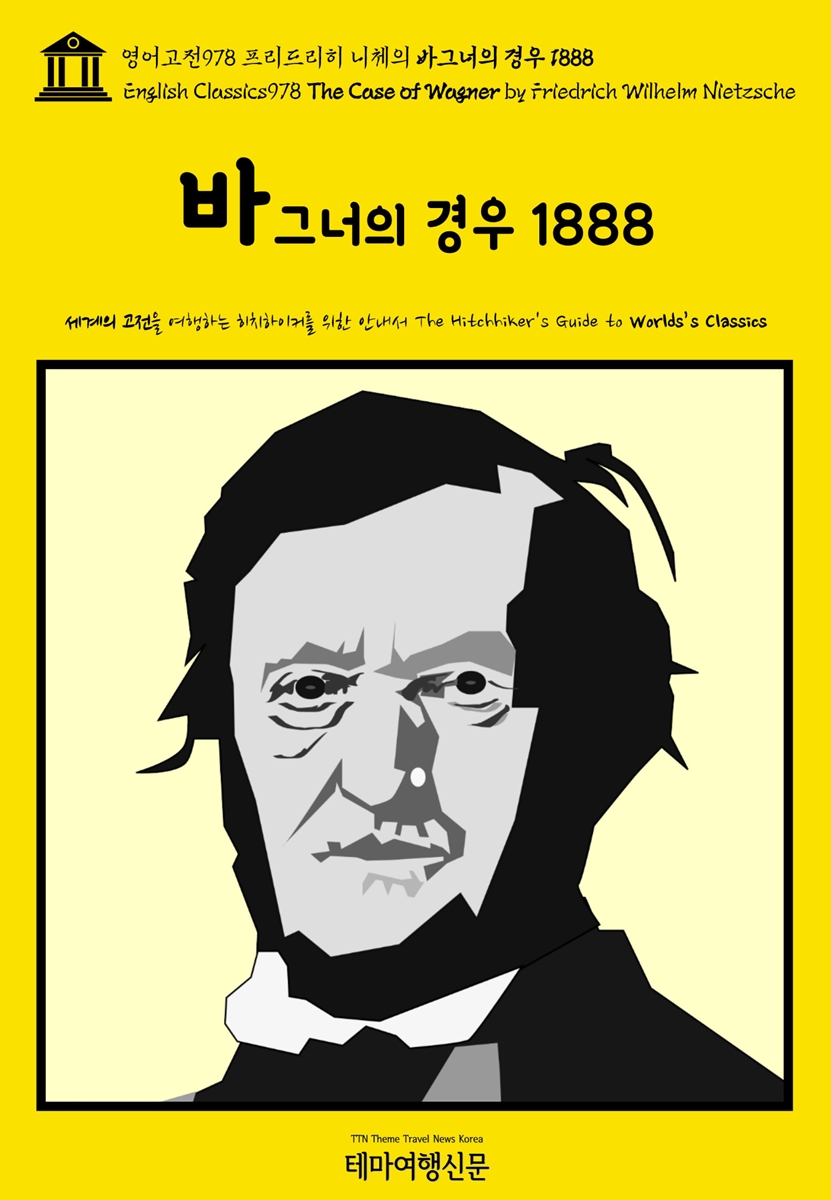▶ 바그너의 경우 1888(The Case of Wagner by Friedrich Wilhelm Nietzsche)은 프리드리히 니체(Friedrich Wilhelm Nietzsche, 1844~1900)가 1888년 출판한 독일 작곡가 리하르트 바그너(ichard Wagner, 1813~1883)에 대한 비평으로, 부제는 음악가의 문제(A Musician's Problem). 니체는 독일 작곡가 라히르트 바그너(Richard Wagner, 1813~1883)의 음악관과 작품을 존경하였고, 청년시절에 집필한 비극의 탄생; 또는 헬레니즘과 염세주의 1872(The Birth of Tragedy; or, Hellenism and Pessimism by Friedrich Wilhelm Nietzsche)를 그에게 헌정하기까지 하였으나, 그가 독일의 민족 운동(V?lkisch movement)과 반유대주의(antisemitism)에 심취한 이후 그와의 결별을 선언한 작품입니다. 니체는 바그너의 음악을 전 유럽에 영향을 미친 허무주의(nihilism)이자 광범위한 질병 현상(symptom of a broader "disease")이라고 표현하였습니다. 테마여행신문 TTN Korea 영어고전(English Classics)과 함께 어제도, 오늘도, 내일도 멋진 문학여행을! B
▶ 볼테르 서거 100주년(1878) 기념 니체 헌정작, 자유로운 영혼을 위한 책(A Book for Free Spirits) 인간적인, 너무나 인간적인 1878(Human, All-Too-Human: A Book for Free Spirits by Nietzsche) : 니체는 독일 작곡가 라히르트 바그너(Richard Wagner, 1813~1883)의 음악관과 작품을 존경하였고, 청년시절에 집필한 비극의 탄생; 또는 헬레니즘과 염세주의 1872(The Birth of Tragedy; or, Hellenism and Pessimism by Friedrich Wilhelm Nietzsche)를 그에게 헌정하기까지 하였습니다만 바그너의 낭만주의 음악(Romantic music)을 계기로 자신만의 사상을 추구하기 시작하였습니다. 인간적인, 너무나 인간적인 1878은 니체가 바그너의 낭만주의적 허무주의를 벗어나 프랑스 계몽철학자 볼테르(Fran?ois-Marie Arouet, 1694~1778)의 자유정신에 매료되기 시작한 분기점이라는 점에서 주목할 가치가 있으며, 볼테르 서거 100주년을 기념해 1878년 헌정한 바 있습니다. 니체의 자유정신에 대한 사상은 5년 후 발표한 차라투스트라는 이렇게 말했다 1883(Thus Spake Zarathustra: A Book for All and None by Friedrich Wilhelm Nietzsche)에서 한층 성숙된 형태로 제시됩니다.
▶ Translator's Preface. Nietzsche's ambition, throughout his life, was to regenerate European culture. In the first period of his relationship with Wagner, he thought that he had found the man who was prepared to lead in this direction. For a long while he regarded his master as the Saviour of Germany, as the innovator and renovator who was going to arrest the decadent current of his time and lead men to a greatness which had died with antiquity. ▷ 번역가 서문. 니체의 평생 야망은 유럽 문화를 재생하는 것이었습니다. 바그너와의 관계 초기에 그는 이러한 방향으로 이끌 준비가 된 사람을 찾았다고 생각했습니다. 오랫동안 그는 그의 주인을 독일의 구세주로, 퇴폐적인 시대의 흐름을 저지하고 사람들을 고대와 함께 사라진 위대함으로 이끌 혁신가이자 혁신가로 여겼습니다.
▶ In Wagner's music, in his doctrine, in his whole concept of art, Nietzsche saw the confirmation, the promotion?aye, even the encouragement, of that decadence and degeneration which is now rampant in Europe; and it is for this reason, although to the end of his life he still loved Wagner, the man and the friend, that we find him, on the very eve of his spiritual death, exhorting us to abjure Wagner the musician and the artist. ▷ 바그너의 음악에서, 그의 교리에서, 그의 예술에 대한 전체 개념에서 니체는 현재 유럽에서 만연하고 있는 퇴폐와 타락의 확증, 촉진, 심지어 격려까지 보았습니다. 그리고 이런 이유로 그는 비록 그의 삶이 끝날 때까지 인간이자 친구인 바그너를 여전히 사랑했지만, 우리는 그가 그의 영적 죽음 직전에 음악가이자 예술가인 바그너를 포기하라고 우리에게 권고하는 것을 발견합니다.
▶ Preface To The Third Edition. That Wagner, too, was a great sufferer, there can be no doubt; not, however, a sufferer from strength, like a true artist, but from weakness?the weakness of his age, which he never overcame. It is for this reason that he should be rather pitied than judged as he is now being judged by his German and English critics, who, with thoroughly neurotic suddenness, have acknowledged their revulsion of feeling a little too harshly. ▷ 제3판 서문. 바그너 역시 큰 고통을 겪었다는 것은 의심의 여지가 없습니다. 그러나 그는 진정한 예술가처럼 강인함이 아니라 약점, 즉 그가 결코 극복하지 못한 나이의 약점으로 고통 받는 사람입니다. 독일과 영국 비평가들에 의해 완전히 신경증적인 갑작스런 감정에 대한 반감이 너무 가혹함을 인정하면서 지금 그를 평가하고 있기 때문에 그가 평가받기보다는 오히려 불쌍히 여겨야 하는 이유입니다.
▶ Preface. I am writing this to relieve my mind. It is not malice alone which makes me praise Bizet at the expense of Wagner in this essay... Nobody, perhaps, had ever been more dangerously involved in Wagnerism, nobody had defended himself more obstinately against it, nobody had ever been so overjoyed at ridding himself of it. A long history!?Shall I give it a name??If I were a moralist, who knows what I might not call it! Perhaps a piece of self-mastery.?But the philosopher does not like the moralist, neither does he like high-falutin' words.… ▷ 머리말. 마음을 달래기 위해 이 글을 씁니다. 내가 이 에세이에서 바그너를 희생시키면서 비제를 찬양하게 만드는 것은 악의만이 아닙니다... 아마도 아무도 바그너주의에 더 위험하게 관여한 적이 없었고, 아무도 그것에 대해 더 완고하게 자신을 방어하지 않았으며, 아무도 자신을 제거합니다. 긴 역사!?이름을 지어줄까요??내가 도덕주의자라면 무엇을 부르지 않을지 누가 알겠습니까! 아마도 자제력의 일부일 것입니다. 그러나 철학자는 도덕주의자를 좋아하지 않으며 고약한 말을 좋아하지도 않습니다.…






